Exactly a century after he wrote it, Jabotinsky's "Iron Wall" essay is suddenly getting a lot of attention. So, too, is the Holocaust.
Increasingly, Israelis are saying "we got our whole approach to defense entirely wrong. Here's what has to change now—with regard to Hamas, and then Hezbollah, and then Iran."
Three items today:
A quick summary of what Israelis are thinking about
Zeev Jabotinsky’s “Iron Wall” essay is back in vogue
And two examples of Holocaust imagery you never thought you’d see again.
With Israel now entering the second month of the “Simchat Torah War” (as it’s starting to be called, though that could well change), Israelis are sadly getting used to the numbing news each morning of how many soldiers were killed the day before, their names and faces, and in many cases, the last letter they wrote home (writing a letter to family is a widespread practice among Israeli soldiers before they head into battle).
There is still much focus on the October 7 slaughter—today there emerged a story about nineteen people who were killed on the beach that morning. They’d gone for a swim when Hamas terrorists came ashore by boat and massacred everyone they could find.
The fate of the hostages continues to grip the country—people struggle not to weep when they think of four year old children in captivity, without their parents, without anyone they know. Who is putting them to sleep? Is anyone holding them, singing to them? Maybe reading them a story in a language they understand? Does anyone come to them when they wake up screaming in the middle of the night? What will they be like when they get out?
This morning’s news carried an interview with a young woman whose 85-year-old grandmother was taken captive. She has dangerously high blood pressure, back problems that require medication, uses a walker— she’s in her 80’s. After the painful interview, the interviewer said, “Thank you for joining us. We hope your grandmother and all the others will be home very soon.” To which the young woman replied, “I’m not optimistic. In her condition, after thirty days …. I doubt it.”
It’s all too much to bear.
But if you read the press carefully, beyond the news of the massacre, you can sense a shift in focus. People are beginning to talk about what happens “after.” “After,” of course, meaning when the war ends. Who will be in charge of Gaza once Hamas is gone? (We’ll address that in a different column this week.)
Perhaps even more fundamental, though, is the question of how do we defend ourselves? The emerging sense is that we can no longer be the bunker in the villa in the jungle—protecting ourselves better and better while allowing a hostile entity to metastasize on our borders.
Because it doesn’t work. Ask the 1400 dead people and the 240 captives.
So Hamas has to be obliterated, no matter what the cost on either side. About that, so far, there is virtually no disagreement in Israel. But after Hamas, what about the north? Will people move back to their homes there as long as Hezbollah remains a potent threat? If not, what do we do about that? Preemptive strike, even though Biden has apparently said “no” to that?
And, of course, Hezbollah and Hamas are both extensions of Iran. Perhaps the days of wait to see what Iran has in mind are also over? That, too, is the “talk of the town.”
One hundred years ago this weekend, there appeared an essay by an “outlier” Zionist thinker, Zeev Jabotinsky. Jabotinsky, who was the mentor of Menachem Begin who would then found the Likud party which Netanyahu has led for many years, was detested by the mainstream Zionists under Ben-Gurion for many reasons, his advocating force against the Arabs in Palestine chief among them. It was not that Jabotinsky sought conflict or relished the specter of battle. It was simply, he insisted in this essay and in many other writings, that mainstream Zionists were deluding themselves about what it was going to take to survive in this land.
This week’s centennial of “The Iron Wall,” as the essay was titled, did not go unnoticed in the Israeli press. Numerous columns not only mentioned it, but insisted that Jabotinsky was right, and that one hundred years after he wrote the essay and 75 years after Israel was created, we need an entirely new approach to our war with the Palestinians.
So to begin, we revisit Jabotinsky’s essay briefly, and then turn to some of the ways it was mentioned or alluded in this weekend’s papers. (The following is adapted from my Israel: A Concise History of a Nation Reborn, pages 105-106).
It was a mistake to underestimate the Arabs, Jabotinsky insisted. They were as attached to Palestine as any other people was to the land on which it lived:
Our Peace-mongers are trying to persuade us that the Arabs are either fools, whom we can deceive by masking our real aims, or that they are corrupt and can be bribed to abandon to us their claim to priority in Palestine, in return for cultural and economic advantages. I repudiate this conception of the Palestinian Arabs. Culturally they are five hundred years behind us, they have neither our endurance nor our determination; but they are just as good psychologists as we are, and their minds have been sharpened like ours by centuries of fine-spun logomachy. We may tell them whatever we like about the innocence of our aims, watering them down and sweetening them with honeyed words to make them palatable, but they know what we want, as well as we know what they do not want. They feel at least the same instinctive jealous love of Palestine, as the old Aztecs felt for ancient Mexico, and the Sioux for their rolling Prairies.
That meant, he said, that the Arabs would never voluntarily come to agreement with the Zionists. If the Zionists wanted a foothold in Palestine, Arab violence would have to be met with an Iron Wall:
[t]his does not mean that there cannot be any agreement with the Palestine Arabs. What is impossible is a voluntary agreement. As long as the Arabs feel that there is the least hope of getting rid of us, they will refuse to give up this hope in return for either kind words or for bread and butter, because they are not a rabble, but a living people. And when a living people yields in matters of such a vital character it is only when there is no longer any hope of getting rid of us, because they can make no breach in the iron wall. Not till then will they drop their extremist leaders, whose watchword is “Never!”
In what would become the guiding spirit of Israel’s political Right in decades to come, Jabotinsky said,
[T]he only way to obtain such an agreement, is the iron wall, which is to say a strong power in Palestine that is not amenable to any Arab pressure. In other words, the only way to reach an agreement in the future is to abandon all idea of seeking an agreement at present.
Now, a few instances of the Iron Wall’s long shadow in this week’s Israeli press:
HEADLINE ABOVE FROM MA’ARIV NEWSPAPER:
“Back to the Iron Wall: Israel needs to adopt Jabotinsky’s worldview, to return and to demonstrate to our enemies that they can never defeat us, and to show the kind of power and determination that is necessary in the barbaric neighborhood in which we live.”
ABOVE: HEADLINE IN LIGHT BLUE FROM THE “PORTRAIT” MAGAZINE SECTION OF MAKOR RISHON (the map is made of military ribbons worn on IDF dress uniforms):
“Why do we win wars, but do not know how to crush our enemies?”
RABBI HAYIM NAVON IN THE “SATURDAY NIGHT” MAGAZINE OF MAKOR RISHON:
Israel’s leaders, and its voters, forgot the lessons of the “Iron Wall”: they yearned for compromise, signaled a willingness to make concessions, showed persistent weakness. They held themselves back even in the face of missile attacks, and made their peace with the presence of terror organizations. One can only hope that now, after the slaughter on Shemini Atzeret [DG-Oct 7 was both Shemini Atzeret and Simchat Torah], no one has any intention of opening a crack in the Iron Wall in the south. Everyone understands that Hamas much be obliterated. But what will our leaders do about Hezbollah? Will they continue to be confident in the false charms of temporary quiet on the northern border, in concessions and self-control, and imaginary deterrence?
In the absence of leaders with the greatness of Ben-Gurion or Jabotinsky, responsibility [for changing Israel’s approach to the conflict] has passed to us, the citizens. We have to delete from our dictionary, plain and simple, the word “deterred” and in its place we must substitute “crushed.” Anyone who dares declare that an enemy of ours has been “deterred” will need to be reminded of the self-confidence with which we used that word when it came to Hamas, up to the very moment of the slaughter.
For the sake of our children’s lives, we must never again allow anyone to crack the Iron Wall.
HOLOCAUST IMAGERY RESURFACES IN AN ISRAEL THAT WAS BEGINNING TO THINK OF IT AS ANCIENT HISTORY
The following video was taken by a soldier who arrived at the scene of the music festival in the Negev after the killing had ended. (If you look carefully at his shadow, you’ll see he has his weapon at the ready. He has no idea whether or not “it” is over.)
We haven’t subtitled it, because the words don’t really matter. Mishehu means “anyone?” Siman hayyim means “sign of life.” He’s calling out, asking for anyone still alive to show a sign of life. Hee metah means “she’s dead.”
Here’s the video taken by the soldier, being shared widely on Israeli social media. I don’t know who first posted it. It’s graphic only in the sense that there are a lot of bodies. You won’t see anyone alive.
Tonight, Sunday night, will mark the day of Shloshim for the victims, the thirtieth day since their death (as tonight will technically be Monday in the Jewish calendar), the conclusion of a period of mourning.
President Herzog has asked every Israeli family to light a memorial candle at 6:00 pm tonight. No reason people outside Israel can’t do it as well.
And if the pile of dead Jewish bodies reminds you of the Holocaust, you’re of course not alone. Consider the tatoo in the photo below.
This is the arm of Hayim Yellin, a resident of Kibbutz Be’eri, where one of the massacres took place. He didn’t need to explain to anyone what tattooing the date October 7 on his arm in that way was supposed to represent.
Why these photos and videos all of a sudden? Because Israel and Israelis know that we’re losing the battle for international legitimacy. It would be too cavalier to say that Israelis don’t care. They know that it matters—they see Jews being attacked throughout the world, whether it’s a murder in Paris or blatant harassment and worse on the campus of Harvard University. They know that the more we lose in the battle of public opinion, the sooner President Biden may shut this operation down, or at least try to.
But the battle for public opinion in Israel is not nearly as much of a concern as is the battle against Hamas, a battle Israelis want to press as hard and as long as it takes. Defense Minister Gallant said yesterday that Israel is going to find and kill Hamas’ head Yahya Sinwar. If the Palestinians do it, he said, the war will be shorter.
They probably won’t, though. So the campaign of destroying Hamas (and yes, with it, huge swathes of Gaza because Hamas used Gaza as an enormous human shield) will proceed, at high cost to us and high cost to them.
We watch videos like the one above, and we’re reminded of the black and white films we still see of Europe during the Holocaust. After that, Jews said “Never Again.” But we Israelis let our guard down.
So we’re saying “Never again”—again. This time, Israelis insist, we mean it. And this time, people should recall as they watch the war unfold, we’ll do what it takes to make that mean something.
As explained above, Shalem College is making use of its financial infrastructure to help the Hamal (which we covered in a previous post) collect funds, and to get 100% of the funds to the Hamal immediately. To support the Hamal, use the link immediately below. There is a place on the web page to note that you want your contribution to be directed to the war effort.
If you’re just joining us, Israel from the Inside typically posts a written column on Mondays and a podcast on Wednesdays. That is obviously irrelevant for the time being.
We’ve delayed all the podcasts that were ready to go, because the people whose stories they tell deserve to tell them when we all have the bandwidth to hear. Hopefully, that will return some day.
In the interim, we’ll post as possible. Here in Israel, there are non-stop funerals to go to, shiva homes to visit, grandchildren to help care for while sons and daughters are in the army, so we’ll see.
Schedules are the least of our worries.
Impossible Takes Longer is now available on Amazon and Barnes & Noble and at other booksellers.
Our Twitter feed is here; feel free to join there, too.
Our Threads feed is danielgordis. We’ll start to use it more shortly.


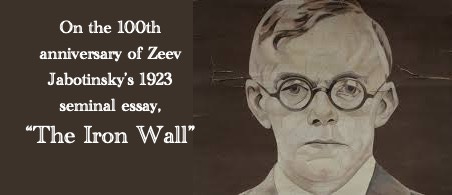

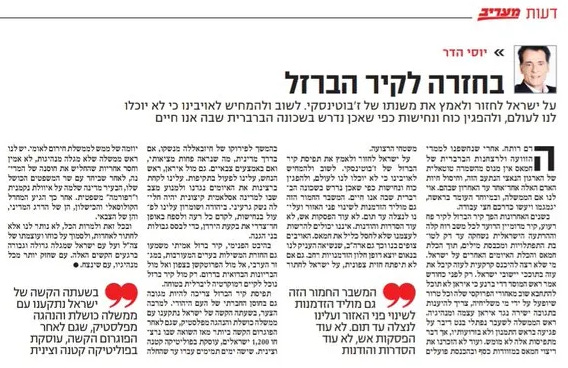
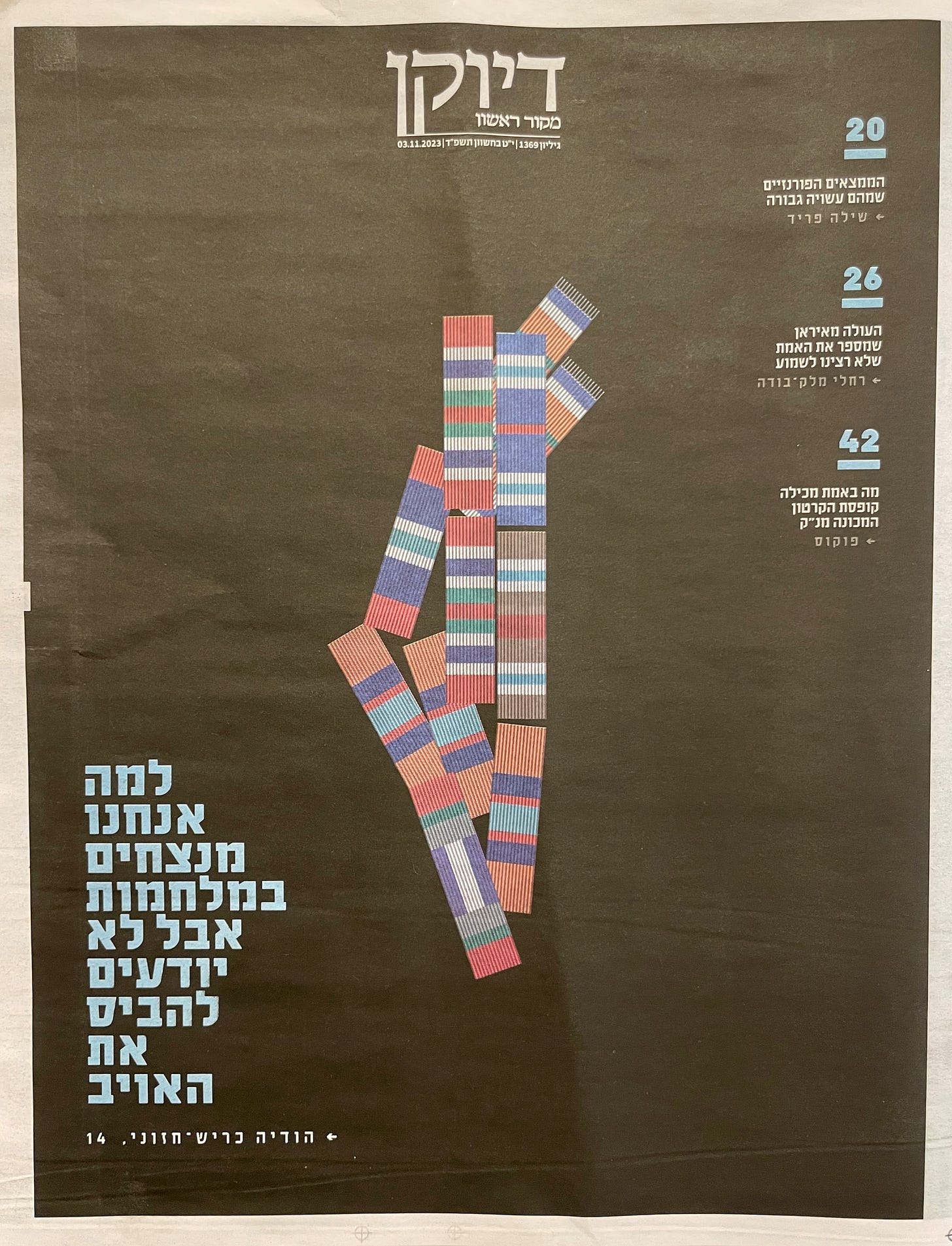
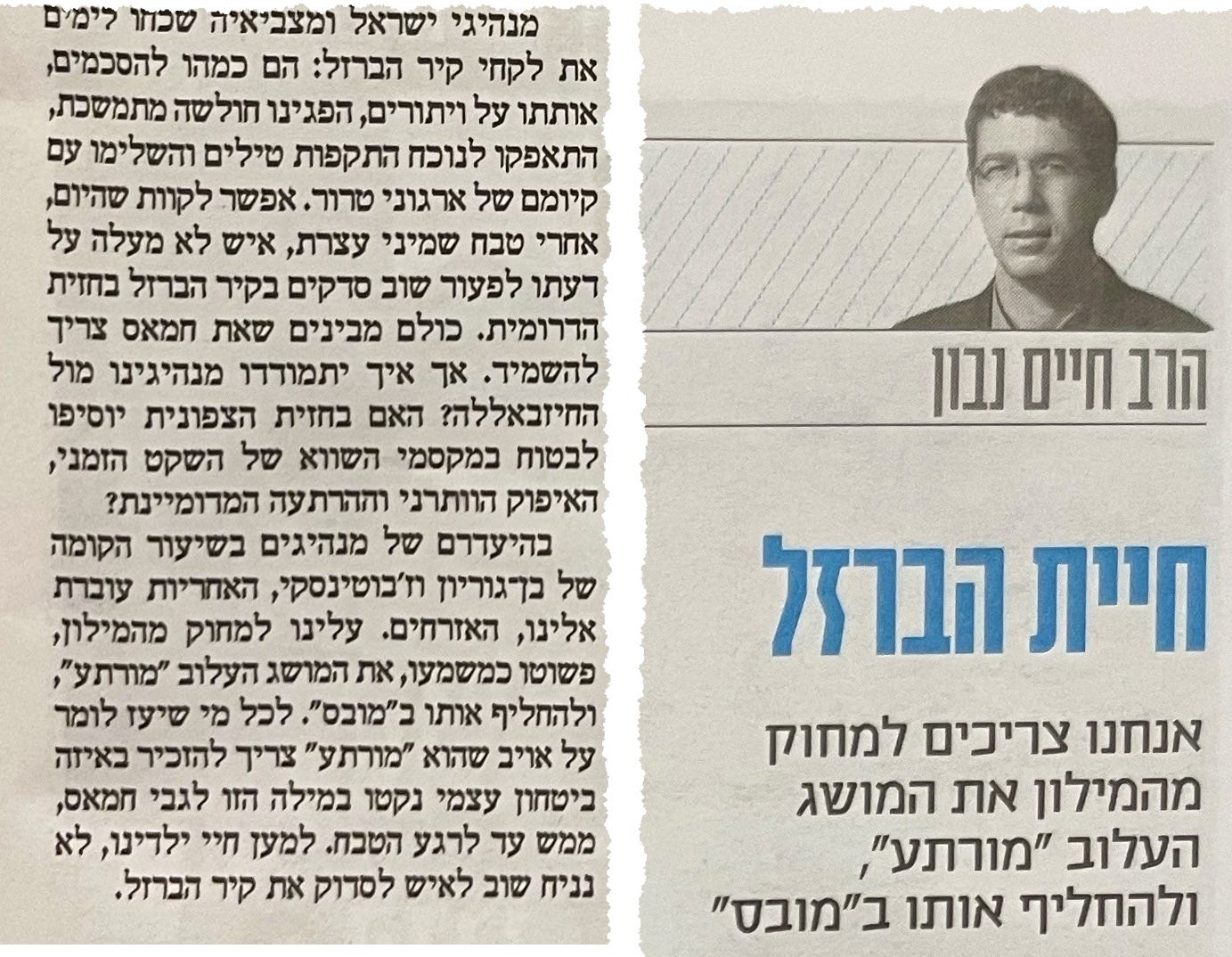

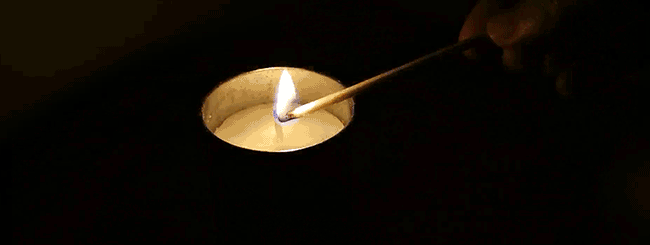
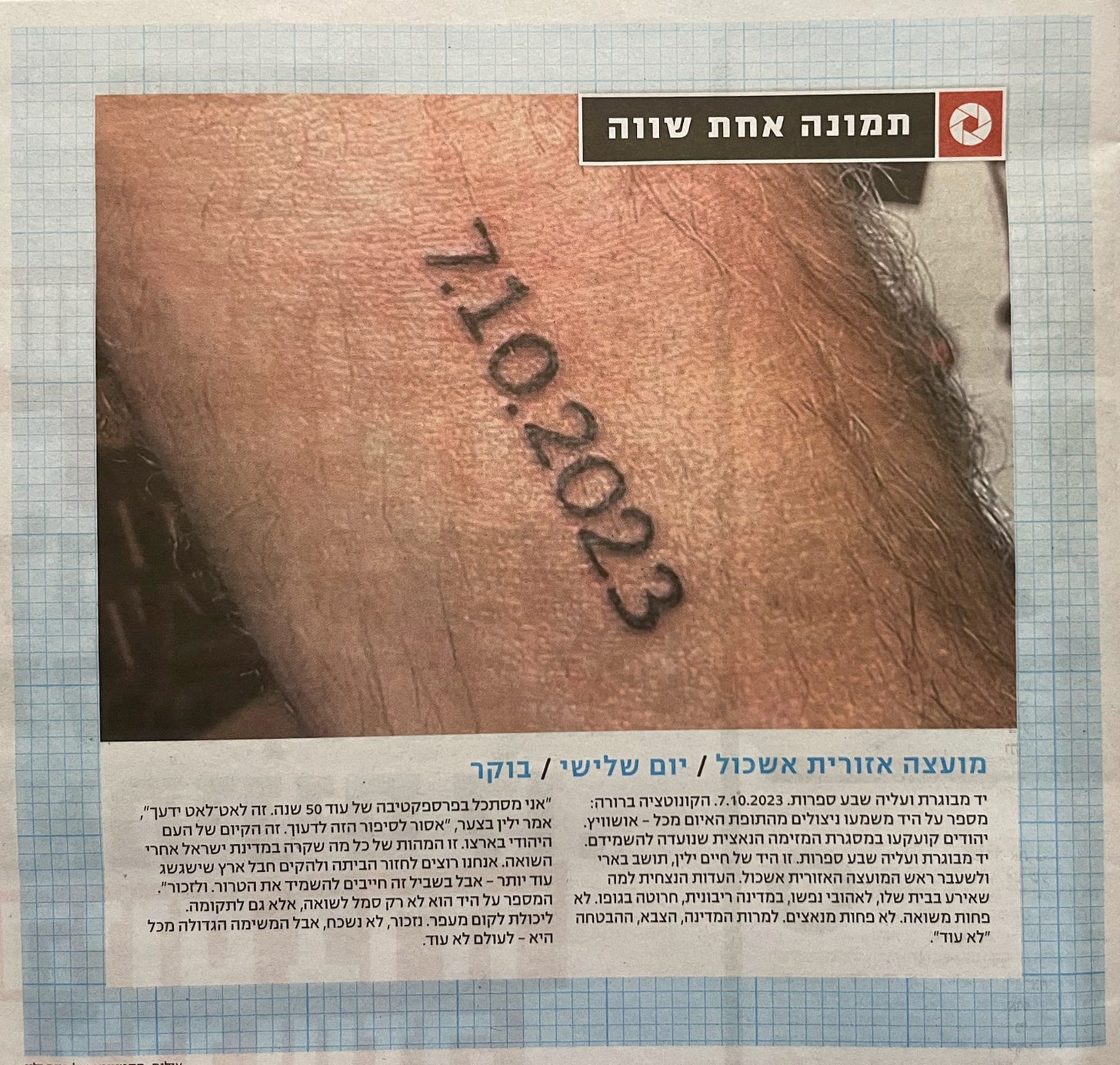





No. They are better at “logomachy” (the battle of words) than we are.
They tell the world we are “occupiers” but Jews have been indigenous in the land for over three millennia.
They say Israel is an “apartheid state” though it is full of Israeli-Arabs and other minorities, while under PA rule, Christian Palestinian life has dwindled, and Arafat insisted that the PA be Judenrein.
They say Israel is committing a “genocide.” Yet the population of Palestinians grows year over year. And It is the Palestinians who preach the eradication of Jews.
75-year-old cities are still called “refugee camps.”
The world distinguishes between ‘terrorists’ and ‘civilians,’ while these innocent civilians call Hamas, Fatah, IJ…. “Liberators”.
I can go on and on. The “two-state solution” and the “peace process” were adopted by Arafat as a means to liberate the land from Jews in a piecemeal fashion.
The Palestinians are not only butchers of people, they are butchers of language, and the BBC, CNN, UN, EU, even the US government is complicit. The adoption of mislabels is not simply naïveté, but is often the result of active collaboration. These are classic Orwellian crimes against language perpetuated against the Jewish people.
Thank you for the news, the accuracy, the reality. We all need it.